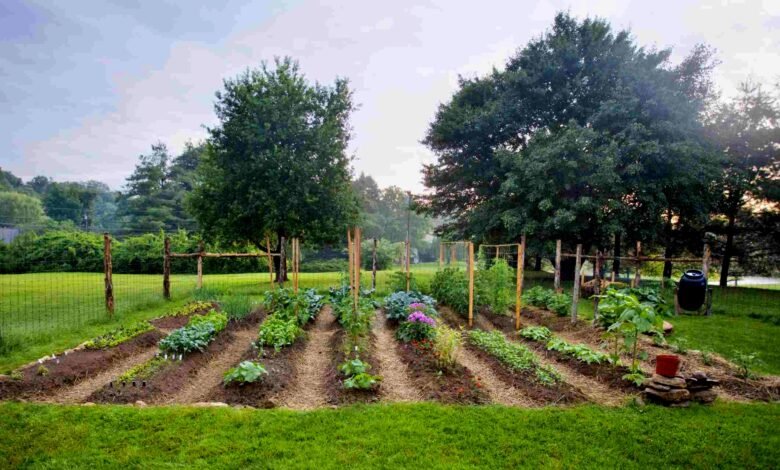Easy Vegetable Gardening Tips for Beginners
This comprehensive guide offers easy vegetable gardening tips for beginners and everything you need to start your vegetable gardening journey successfully.

Starting a vegetable garden can be one of the most rewarding experiences, especially for beginners looking to dip their toes into gardening. With the right vegetable gardening tips and a touch of patience, you can cultivate a lush, productive garden right in your backyard. Whether you’re dreaming of fresh tomatoes, crisp lettuce, or crunchy carrots, this comprehensive guide offers everything you need to start your vegetable gardening journey successfully.
Why Start a Vegetable Garden?
Before we dive into the essential vegetable gardening tips, it’s worth considering why gardening is such a beneficial hobby:
- Healthier Eating: Home-grown vegetables are fresher, more nutritious, and free from harmful chemicals.
- Cost-Effective: Growing your own produce can save you money on groceries.
- Sustainability: Gardening reduces carbon footprints and promotes a greener lifestyle.
- Mental Well-being: Gardening has been shown to reduce stress and improve mood.
Choosing the Right Location
One of the most important vegetable gardening tips is selecting the proper location. Your garden’s success largely depends on where you plant it.
- Sunlight: Most vegetables need at least 6 to 8 hours of direct sunlight per day.
- Soil Quality: Ensure your soil is well-draining and rich in organic matter.
- Accessibility: Choose a location that’s easy to reach for regular watering, weeding, and harvesting.
Starting with the Right Tools
Investing in the right gardening tools can make your gardening tasks easier and more efficient:
- Garden gloves
- Trowel and spade
- Hoe
- Watering can or hose with a spray nozzle
- Garden fork
- Pruners or shears
Having these tools handy is a foundational vegetable gardening tip for smooth garden maintenance.
Preparing Your Soil
Good soil is the cornerstone of a thriving vegetable garden. Here’s how to prepare it:
- Test Your Soil: Check pH levels and nutrient content using a soil testing kit.
- Amend the Soil: Add compost, manure, or organic fertilizers to enrich the soil.
- Tilling: Break up compacted soil to improve aeration and root penetration.
Choosing the Right Vegetables
For beginners, it’s smart to start with easy-to-grow vegetables that don’t require complicated care.
- Tomatoes: High-yield and great for salads or sauces.
- Lettuce: Fast-growing and can be harvested multiple times.
- Radishes: Matures quickly and ideal for small spaces.
- Carrots: Require loose soil and consistent moisture.
- Zucchini: Produces abundantly and resists many pests.
Selecting the right crops is one of the most valuable vegetable gardening tips for new gardeners.
Planning Your Garden Layout
Organizing your garden layout improves both aesthetics and functionality:
- Row Gardening: Traditional method, good for larger spaces.
- Square Foot Gardening: Ideal for small gardens, maximizing space efficiently.
- Container Gardening: Perfect for patios, balconies, and urban settings.
- Raised Beds: Offer better soil control and drainage.
Watering Techniques
Proper watering is essential. Here are some vegetable gardening tips related to irrigation:
- Consistency is Key: Most vegetables need 1-2 inches of water per week.
- Water in the Morning: Reduces evaporation and disease risk.
- Soaker Hoses or Drip Irrigation: Efficiently deliver water directly to roots.
- Mulching: Retains soil moisture and reduces watering frequency.
Fertilizing Your Garden
Your vegetables need the right nutrients to thrive:
- Organic Fertilizers: Compost, fish emulsion, and bone meal are excellent natural choices.
- Timing: Apply fertilizers during the growing season as per plant needs.
- Avoid Over-Fertilizing: Too much fertilizer can harm plants or lead to excessive leaf growth with little fruit.
Weed and Pest Management
Maintaining a weed-free and pest-resistant garden is crucial:
- Weed Regularly: Use a hoe or hand-pull weeds to prevent competition for nutrients.
- Mulch Heavily: Suppresses weeds and maintains soil temperature.
- Natural Pest Control: Neem oil, insecticidal soap, or introducing beneficial insects like ladybugs.
- Crop Rotation: Reduces disease risk and pest build-up.
Harvesting Tips
Harvesting at the right time ensures maximum flavor and yield:
- Check Maturity Dates: Refer to seed packets or plant tags.
- Use Sharp Tools: Prevents damage to plants.
- Frequent Harvesting: Encourages plants to produce more.
Seasonal Vegetable Gardening Tips
Adapt your gardening strategies based on the season:
Spring:
- Start cool-season crops like spinach, peas, and lettuce.
- Prepare beds and test soil.
Summer:
- Focus on warm-season crops like tomatoes, cucumbers, and peppers.
- Ensure regular watering and pest control.
Fall:
- Plant root crops and leafy greens.
- Clean up garden debris to prevent disease.
Winter:
- Plan for next season.
- Mulch and protect perennials or overwinter crops.
Companion Planting Strategies
Companion planting involves placing plants together for mutual benefit:
- Tomatoes and Basil: Basil improves tomato flavor and repels pests.
- Carrots and Onions: Onions deter carrot flies.
- Corn, Beans, and Squash: The “Three Sisters” technique from Native American gardening.
Learning effective companion planting is one of the advanced vegetable gardening tips that boosts productivity.
Common Mistakes to Avoid
Being aware of common pitfalls can save a lot of trouble:
- Overwatering: Causes root rot and other fungal diseases.
- Neglecting Soil Health: Always amend and rotate crops.
- Planting Too Close: Leads to competition and poor airflow.
- Ignoring Labels: Follow spacing and sunlight requirements.
Organic Vegetable Gardening Tips
Growing organically ensures your vegetables are chemical-free:
- Use compost and organic fertilizers.
- Avoid synthetic pesticides.
- Practice crop rotation and polyculture.
- Encourage beneficial insects and birds.
Tools for Garden Planning and Tracking
Stay organized and monitor your garden’s progress:
- Gardening Journals: Record planting dates, weather, and yield.
- Mobile Apps: Try apps like Gardenize or Planter.
- Calendars and Planners: Schedule tasks and harvest times.
Indoor Vegetable Gardening Tips
Even if you lack outdoor space, you can garden indoors:
- Use grow lights for proper lighting.
- Choose small plants like herbs, cherry tomatoes, or lettuce.
- Ensure good ventilation and humidity control.
Community and Support
Joining a gardening community can be immensely helpful:
- Local gardening clubs
- Online forums and Facebook groups
- Community gardens
Learning from experienced gardeners and sharing your journey keeps you motivated.
Conclusion
These easy vegetable gardening tips provide a strong foundation for any beginner looking to start a thriving home garden. By choosing the right location, selecting suitable crops, and following smart gardening practices, you can enjoy the satisfaction of harvesting your own fresh produce. Whether you’re growing in a backyard, balcony, or kitchen windowsill, the principles remain the same: care for your soil, nurture your plants, and continue learning.











